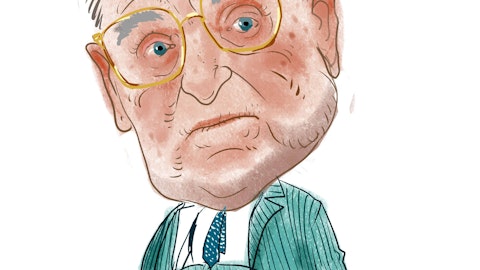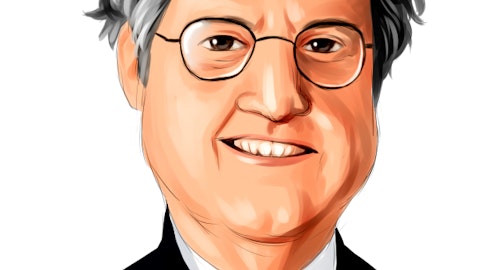1. JPMorgan Chase & Co. (NYSE:JPM)
Number of Hedge Fund Holders: 100
JPMorgan Chase & Co. (NYSE:JPM) is one of the biggest banks in the world and its PE ratio shows that it’s also one of the most undervalued. Insider Monkey’s database of over 940 hedge funds and their holdings shows that 100 elite hedge funds had stakes in JPMorgan Chase & Co. (NYSE:JPM) as of the end of the fourth quarter of 2022. The total worth of these stakes was about $5.2 billion. The biggest stakeholder of JPMorgan Chase & Co. (NYSE:JPM) during this period was Edgar Wachenheim’s Greenhaven Associates which owned about 4.8 million shares of the company.
Earlier this month, data showed that JPMorgan Chase & Co. (NYSE:JPM)’s credit card delinquency rate in January came in at 0.83%, compared to 0.76% in December.
JPMorgan Chase & Co. (NYSE:JPM) is also a dividend-paying stock. JPMorgan Chase & Co. (NYSE:JPM) has upped its dividend consistently for over a decade now.
Here is what Vltava Fund has to say about JPMorgan Chase & Co. (NYSE:JPM) in its Q3 2022 investor letter:
“We regard JPM to be the strongest and best- managed bank in the world. It is a leader in investment banking, commercial banking, credit cards, and asset management. Its size (the largest bank in the USA, with nearly USD 4,000 billion in assets) and diversification give it a strong competitive advantage that is compounded by its cost advantages and the high costs to clients associated with switching banks. JPM’s management prides itself on running the only large bank to avoid major instability over the long term.
JP Morgan’s quality and strength first became fully evident in 2008 under the leadership of its CEO Jamie Dimon. Not only did JP Morgan help to stabilize the market by taking over the failing Bear Stearns in the spring of that year, but throughout the Great Financial Crisis it was the only big US bank that did not require government assistance and it was highly profitable even in the difficult year of 2008.
A well-functioning and efficient bank can be a very good long-term investment, because the interest compounding effect works well here. JPM’s return on equity (ROE) is well into the double digits and this puts it in a good position to continue producing better long-term returns than does the market. JPM has been very profitable even during years when interest rates were close to zero. The current – and perhaps not temporary – return to somewhat more normal, higher interest rates should have a significantly positive impact on the bank’s interest income and overall profitability.”
You can also take a peek at 19 Biggest Outdoor Brands and Companies and 10 Most Undervalued Solar Stocks to Buy.





